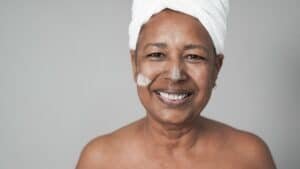
Now that we are over 60, I think we can all agree – we’ve spent enough time, money, angst, and celebration seeking the best, worst, and most effective products for our delicate skin. Some dry us out, some over moisturize, and some are just right for the moment, and then things change. Our skin changes with years, seasons, temperature, hormones, stresses, pollutants, and on and on.
I was looking for a facial serum that would meet certain criteria. I wanted all organic, gentle, hydrating, protective, nourishing, toning, plant-based, and aromatic. What I absolutely did not want was the following: the first ingredient to be water, plenty of added preservatives, wrapped in plastic, filled with chemicals, corporate oversights for stockholders, or a serum that was outrageously expensive.
I couldn’t find one that met all of my criteria, so being a woman over 60 with a need, I went on a hunt. I researched, experimented, tested on friends and family, researched and experimented some more, and created my own, GYG Organic Facial Serum!
Now that I have done the research, I would like to share with the wonderful tribe of Sixty and Me, the dos and don’ts of skincare.
With a few mindful steps, you can protect, heal, and restore your skin in a way that keeps you healthy and helps the environment.
Healthy Skincare Choices
Given my experience with researching, experimenting, and developing a plant-based, organic, facial and body serums, I would like to share a few tips in choosing the best products for your delicate and lovely skin.
- Choose organic! Organic essential oils represent a practice and philosophy that is designed to be environmentally friendly, sustainable, healthy, and more supportive towards the agricultural community as a whole. When in doubt, choose organic.
- Read your labels. Basically, as you’ve heard this before, if you don’t know what it is, can’t pronounce it, or it sounds ‘chemical’, stay away from it. Don’t buy synthetics and preservatives, and don’t purchase expensive water.
- If it is toxic, it is not safe for your skin. You should be able to ingest whatever you put on your skin.
- Use facial acupressure to apply anything on your face.
- Use warm water, not too hot or too cold; just right a la Goldilocks!
- Give yourself a steam facial and apply a mask once a week.
Winter-Proof Your Skin with These Tips
Winter skin is more fragile so take a few extra steps.
Nourish Daily
Apply serum or moisturizer directly to your moist skin after bathing so the moisturizer can help trap surface moisture. Apply gentle nourishment to your skin any time it feels too dry.
Cleanse Daily
Gently cleanse your skin, but don’t overdo it. Too much cleansing removes the skin’s natural moisturizers. Use a clean washcloth each time.
Limit the Use of Hot Water and Soap
If you have “winter itch,” take short lukewarm showers or baths and immediately afterward, apply a thin film of body serum (like GYG Organic Body Serum) or any hydration. Gently pat your skin dry.
Humidify
Dry air can remove the moisture from your skin. Room humidifiers are great but do clean according to instructions to reduce mold and fungi.
Limit Wind Exposure
Protect yourself from the wind. Cover your face and use a serum or skin protectant.
Avoid Extreme Cold Temperatures
Very cold weather can cause skin disorders or frostbite in some people. If you develop extreme pain followed by loss of sensation in a finger or toe, you may have frostbite.
Protect Your Skin from the Winter Sun Too
Use a sunscreen if you plan to be outdoors for prolonged periods.
Avoid Winter Tanning
Tanning beds and artificial sunlamps are always damaging to the skin and increase the risk of skin cancer.
Take Vitamin D Supplements
In summer, your natural vitamin D production increases from daily sun exposure, but when winter rolls around that exposure decreases.
Go to a Professional
See your dermatologist if you have persistent dry skin, scaling, itching, rashes, or skin growths that concern you.
Always Go Natural
Keep the natural oils your skin produces. Add moisture from the inside out by more water to hydrate your skin.
Avoid These Additives… A Long List Worth Noting
To protect your skin and keep it as healthy, avoid products that contain any of the following chemicals:
- BHA & BHT are preservatives considered to be carcinogens.
- Borates
- Coal Tar leads to skin, lung and liver cancers as well as DNA mutations.
- Formaldehyde and preservatives are known carcinogens.
- Mercury is toxic to the brain and nervous system.
- Hydroquinone exposure leads to tumor development.
- Oxybenzone can cause DNA mutations, and cardiovascular concerns.
- Triclosan is an endocrine disruptor.
- Parabens are endocrine-disrupting chemicals.
- Fragrance manufacturers don’t have to disclose chemical ingredients, so be extra careful.
- Phthalates cause hormone balance issues.
- Petroleum Distillates are a possible carcinogen.
- Siloxanes and Cyclomethicone, are harmful to the environment.
- Toluene affects the nervous system.
- Retinol and some forms of vitamin A may not be safe to put on your skin.
Summary
Read your labels, avoid toxins, go organic, and treat your beautiful skin as the jewel that it is. Keep your skin glowing at every age and every season. Remember, as Annie sang, “You are never fully dressed unless you are wearing a smile!”
If you haven’t already, please take a moment to fill out our short end-of-year survey.
Let’s Have a Conversation:
How do you take care of your skin in the winter months? Do you moisturize differently when the weather is cold? How often do you read your cosmetics labels? Has a product’s ingredient list stopped you from purchasing it?





